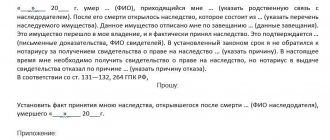Home » Inheritance » Tax on inheritance
48
Part 3 of Federal Law No. 156 “Civil Code of the Russian Federation” dated November 26, 2001. (hereinafter referred to as the Civil Code of the Russian Federation) defines the basic rules and principles of succession. There are two ways to enter into an inheritance after the death of a relative: by will or by law. In the first case, the inheritance mass is distributed in whole or in part according to the will of the deceased. In the second, property is inherited depending on the degree of close relationship with the deceased, since the testator did not make a will during his lifetime.
Is property received by inheritance taxed?
Relatives often ask whether it is necessary to pay tax on inheritance from close relatives, and what its amount is. In July 2005, Federal Law No. 78 amended the Tax Code of the Russian Federation (hereinafter referred to as the Tax Code of the Russian Federation), according to which this tax was abolished. The amendment was fixed in paragraph 18 of Art. 217 of the Tax Code, and from that moment on, the following types of inherited property were excluded from the tax base:
- for real estate;
- to the ground;
- for transport;
- to bank deposits.
Clause 18 of Art. 217 of the Tax Code of the Russian Federation also defined cases when inherited property tax is levied on legal successors:
- remuneration to authors of scientific and literary works;
- payment for writing works of art;
- patents for inventions and industrial designs (models).
Such an inheritance is included by law in the personal income tax (personal income tax) tax base and is taxed at the rate in effect at the time of inheritance. In 2021, personal income tax is 13%.
Is inheritance from a will subject to tax?
The owner of the property can dispose of acquired valuables in advance, dividing them among relatives, leaving everything to one person, strangers or organization. Then the heir enters into inheritance rights in accordance with the will.
The basic requirements for document execution are the presence of certification by a notary; when staying in another state - by the consulate of the Russian Federation. In exceptional cases, it can be certified by another person: the head physician of a city hospital, the director of a nursing home, the captain of a ship, the head of an Arctic station, the commander of a military unit, the head of a prison, and subsequently certified by a notary at the place of residence of the owner of the valuables.
Property received under a will is not subject to tax. This is stipulated by Art. 217 Tax Code of the Russian Federation. The law states that if the heir received income in cash or property, no tax is paid. The exception is income in the form of permanent payments for copyrights or a patent for an invention, which were inherited.
conclusions
For clarity, let us give the following example: the testator bequeaths all his property to one heir (assuming that there are no heirs of the obligatory share) - a legal entity (clause 2, clause 1, article 1116 of the Civil Code of the Russian Federation). The same heir is entrusted with the obligation to fulfill the testamentary refusal. A legal entity is not a payer of property tax transferred by inheritance (Article 1 of the Law). The legatee is also not a payer of such tax.
A legal entity receives non-operating income in the form of property received free of charge (clause 8, article 250 of the Tax Code of the Russian Federation). There are reasonable doubts that such a basis for transferring property into the ownership of a legal entity should be recognized as income. Let us give the following addition.
The testator was the founder of a legal entity, having a share in the authorized capital of 51%. This share is bequeathed to a specific heir - an individual. Other property denied
in a will to this legal entity. The execution of a testamentary refusal is entrusted to the heir to the share (Article 1137 of the Civil Code of the Russian Federation). Such income (non-operating) is not taken into account for tax purposes (paragraph 4, paragraph 11, article 251 of the Tax Code of the Russian Federation).
The legatee receives his property (or does not receive it). Here you can already improvise with lost profits, losses, and the use of other people's money. In this situation, the provisions of the Civil Code of the Russian Federation on obligations apply (we understand that in this situation, organizing a trial is a matter of technique).
After a year, the legal entity can sell the inherited property, give it to its creditors, or be liquidated. The property tax of legal entities is disproportionately less than the inheritance tax.
Alexander Gushchin
, lawyer, member of the Moscow Bar Association "Filippov and Partners"
Bukhgalteriya.ru recommends
Invaluable experience in solving current problems, answers to complex questions, specially selected latest information in the press for accountants and managers. Magazines for accountants and entrepreneurs >>
If you have a question, ask it here >>
What is the amount of inheritance tax?
Tax is not levied on property inherited without a will, but a mandatory payment is its component - a state duty or fee. Unlike a tax, it is one-time in nature and is not paid free of charge, but for the completion of a legally significant action. Thus, the tax upon entering into inheritance rights means precisely the state duty.
Tax amount without a will
The state duty consists of two parts:
- for performing notarial acts - paid by the successor when contacting a notary and drawing up primary documents regarding the opening of inheritance proceedings;
- for issuing a certificate of inheritance.
The amount of state duty is calculated individually and depends on several factors: which line of heirs the relative belongs to, what is the value of the property.
According to Art. 333.24 of the Tax Code of the Russian Federation in 2021, the amount of the notary payment (GP for inheritance proceedings) is:
- certification of a completed will – 100 rubles;
- opening and reading of a closed will – 300 rubles;
- measures to inventory and protect the hereditary mass (property) – 600 rubles.
Important! According to Art. 333.24 of the Tax Code of the Russian Federation, a single cost of services is established for all notaries.
If, in order to perform notarial acts, a notary is forced to travel to the client’s territory, then, according to Article 333.25, the amount of GP to be paid must be increased by 1.5 times.
The amount of the state fee for obtaining a certificate of inheritance is reviewed annually.
If the inheritance is received without a will, that is, by law, the percentage of GP in 2021 is equal to:
- For close relatives (sons or daughters, surviving spouse, parents), brothers and sisters (siblings and step-children) – 0.3% of the value of the property, maximum 100 thousand rubles.
- For other relatives - 0.6% of the value of the property, maximum 1 million rubles.
Tax amount according to will
The amount of state duty when receiving an inheritance under a will does not differ from the amount required to be paid when inheriting by law. Notary services (fixed amount) and a percentage of the value of property assets are subject to payment: for heirs of 1st and 2nd stages - 0.3% of the value of the property, but within 100 thousand rubles, for other stages - 0.6% within 1 million rub.
If there are several successors, then the state duty must be paid by each of them. Payment details are provided by the notary. The payment is made in cash at the bank's cash desk or by bank transfer before notarial acts are completed.
Inheritance tax for close relatives must be paid within 6 months from the date of opening of inheritance proceedings. If payment deadlines are missed for a good reason, you must apply to the court with an application for reinstatement and indicating the reasons for the delay.
Heir and legatee: similarities and differences
The similarity of these subjects of inheritance law lies in the moment of emergence of the rights belonging to them:
- the right to accept an inheritance arises at the time of opening of the inheritance (death of the testator - Article 1113 of the Civil Code of the Russian Federation)
- the right to receive a testamentary refusal also arises at the time of opening of the inheritance
The main differences between an heir and a legatee:
1. within the time limits established for the acquisition of inheritance and testamentary refusal
- the inheritance can be accepted by the heir within 6 months (Article 1154 of the Civil Code of the Russian Federation);
— a testamentary refusal can be received by the legatee within 3 years.
2. in the legal position of the heir and legatee in relation to the legacy
- the heir is the executor of the testamentary refusal (clause 1.art. 1138 of the Civil Code of the Russian Federation);
- the legatee is its recipient (Clause 4.Article 1137 of the Civil Code of the Russian Federation).
From the moment the inheritance is opened, the relationship of debtor and creditor is established between the heir, who is obliged to execute the testamentary refusal, and the legatee (clause 3 of Article 1137 of the Civil Code of the Russian Federation).
Separating the legal status of the heir and legatee in relation to the legacy, it seems necessary to also consider several additional issues.
What happens in the case when the heir, who, in accordance with the will, is entrusted with a testamentary refusal, refuses to accept the inheritance?
The answer can be given based on Art. 1140 of the Civil Code of the Russian Federation, according to which, if the heir refuses the inheritance or does not enter into the inheritance, the obligation to execute the testamentary refusal passes to the other heirs. In other words, the legatee in any case receives the property denied to him, even if all the heirs refuse the inheritance and the inherited property must become the property of the state.
The legal status of the inherited property that is the subject of a testamentary refusal before the legatee receives this inherited property. What is the possibility and procedure for the ownership, use and disposal of this property by the heir?
To answer, let us return to the main provisions regarding testamentary refusal.
To acquire an inheritance, the heir must accept it (Clause 1.Article 1152 of the Civil Code of the Russian Federation). Acceptance does not mean that the inherited property in its entirety passes to the heir solely on the right of ownership, since in addition to the property that will be his property, which he can own, use, dispose of at his personal discretion, property that is his does not belong by right of ownership - inherited property passing to the heir for the payment of the testator's debts, for the execution of a testamentary refusal, as well as the execution of a testamentary assignment.
Important!
With regard to the payment of the testator's debts, it is necessary to take into account that the heirs are liable for his debts within the limits of the inherited property transferred to them (clause 1 of Article 1175 of the Civil Code of the Russian Federation).
Taxes upon inheritance of real estate
If real estate is subject to inheritance, the heir will incur additional costs associated with registering the property. The amount of the fee is specified in Art. 333.33 Tax Code of the Russian Federation.
In general cases, the amount charged from individuals for registering rights to real estate is 2 thousand rubles, from legal entities - 22 thousand rubles. However there are exceptions:
- when registering ownership of an inherited land plot intended for the construction of housing or outbuildings, or running a dacha farm, the payment will be 350 rubles;
- when registering the right to part of agricultural land, the fee is 100 rubles;
- if the inherited real estate is part of a mutual investment fund, registering ownership rights to it will cost 22 thousand rubles;
- registration of the right to a share of the common part of real estate in an apartment building will cost 200 rubles;
- if state registration of a mortgage is necessary, the fee for individuals will be 1 thousand rubles, for legal entities - 4 thousand rubles;
- if it is necessary to change the content of the shared construction agreement due to a change in the party to the agreement, the payment amount will be 350 rubles.
"Rejection" chores
Testamentary disclaimer is an obligation assigned in the will to the heir or heirs. In addition, paragraph 1 of Art. 1138 of the Civil Code of the Russian Federation establishes limits for the execution of a testamentary refusal.
Thus, a testamentary refusal must be executed within the limits of the value of the inheritance passed to the heir
, minus the debts of the testator attributable to him.
In accordance with Art. 1112 of the Civil Code of the Russian Federation, the inheritance includes the inherited things that belonged to the testator on the day the inheritance was opened, and other property, including property rights and obligations, with the exception of personal property rights, as well as non-property rights and intangible benefits.
In accordance with Art. 1110 of the Civil Code of the Russian Federation, the inherited property of the deceased passes to other persons in the order of universal succession.
Universal succession in inheritance law is generally understood as the transfer of inheritance (hereditary property) unchanged as a single whole and at the same moment.
In law
inherited property passes to the heirs on the same rights that the testator had to this property at the time of his death. In accordance with paragraph 2 of Art. 1141 of the Civil Code of the Russian Federation, inherited property passes to the heirs by law in equal shares, with the exception of heirs who inherit by right of representation. Therefore, if the testator had property under the right of ownership, then this property should pass to the heirs under the right of ownership.
In the will
the testator has the full right to dispose of his property and the rights that he has to this property at his personal discretion (Article 1119 of the Civil Code of the Russian Federation).
Based on the above, it seems possible to consider the following situation.
The testator makes a will. According to the principle of freedom of will, the testator makes it at his own discretion.
In the will, the testator obliges one or more heirs directly indicated in the will to execute a testamentary refusal from the part (value) of the inherited property passing to him (them). In accordance with this testamentary refusal obliges the heirs to transfer this property or part of it to the legatee into ownership. The legatee has the right to receive a testamentary refusal by applying for its execution to the heir within three years from the date of opening of the inheritance (death of the testator) (Clause 4.Article 1137 of the Civil Code of the Russian Federation).
Until the legatee applies to the heir with a request to fulfill the testamentary refusal, the second may own, use and dispose of the inherited property passing to him on the conditions and to the extent to which the testator determined the heir's rights to the inherited property in the will.
By entrusting the heir with the execution of a testamentary refusal, the testator thereby limits the heir's right to dispose of the property transferred to him. With regard to the rights of the heir to own and use this property, which is the subject of a testamentary refusal, no restrictions are provided for in the will.
So, the heir, on whom the testator has entrusted the obligation to fulfill the testamentary refusal, acquires in the order of inheritance the right to own and use the property transferred to him in the order of inheritance. In this case, the heir’s right of disposal is limited by the testator, that is, he is deprived of this right. This restriction implies the inability of the heir to dispose of the property transferred to him at his own discretion. He can only transfer it into ownership to the legatee. Therefore, we can conclude that when a testamentary refusal is assigned to an heir, the property does not become his property, since the right of ownership in accordance with Art. 209 of the Civil Code of the Russian Federation implies a combination of its three components (the right of ownership, use and disposal) that are absolute and unrestricted (except by law), which the owner can use at his own discretion.
In this regard, it should be noted that when a testamentary refusal is assigned to an heir, he does not receive the property transferred to him as his own. By virtue of the Civil Code of the Russian Federation, it is subject to other property rights
, which, unfortunately, in Art.
216 of the Civil Code of the Russian Federation, which establishes the types of real rights of persons who are not owners, does not give a corresponding name (the list of types of real rights specified in Article 216 of the Civil Code of the Russian Federation is not exhaustive). But we can define it as the right to own and use property with a limited right of disposal.
Attention
It seems that when writing a will and indicating in it an heir, whom the testator obliges to fulfill a testamentary refusal from the part (value) of the inherited property passing to him, in this will it is also advisable to indicate the rights that pass to the heir to this property (the right of ownership and use - without restrictions, the right of disposal is limited by testamentary refusal).
Thus, the heir can convert the property that is the subject of a testamentary refusal into his own property only by violating the law, i.e. by failing to fulfill the debtor's obligation to the creditor (legatee).
The heir's right of ownership of the object of the legacy may arise only if the legatee:
- did not take advantage of the right granted to him by the testator to demand execution of the testamentary refusal within the time allotted by the legislator for obtaining the testamentary refusal,
- died before the opening of the inheritance or at the same time as the testator,
- refused to accept the testamentary refusal,
- lost the right of testamentary refusal,
- unless the will specifies another legatee (clause 3 of Article 1138 of the Civil Code of the Russian Federation).
Tax upon inheriting a house or apartment
The property tax obligatory for payment by the heir of an apartment or house is a local tax (Article 399 of the Tax Code of the Russian Federation). It is collected from the owners of any premises and structures. The common property of an apartment building is not subject to taxation: storage rooms, attics, ventilation shafts, adjacent areas or structures, etc.
Tax rates are established by municipal authorities (Article 406 of the Tax Code of the Russian Federation).
The tax base is the cadastral value of an apartment minus the cost of 20 m2 of its area, and for a house - minus 50 m2 of its area.
Preferential categories include disabled people of groups 1, 2 and childhood, WWII participants, pensioners and other persons, the circle of whom is outlined in Art. 407 Tax Code of the Russian Federation.
Payment of property tax
Since the heir, in respect of whom, in accordance with the will, is entrusted with the obligation to execute the testamentary refusal, in no way can acquire ownership rights to the hereditary property that is the subject of the testamentary refusal, but only acquires another property right to it with a limited right of disposal, the obligation to pay this tax from he (the heir) does not arise
– he is not a payer of property tax transferred by inheritance, since such property does not become his property by inheritance.
The heir becomes obligated to pay tax
only if such property becomes his property on the grounds stated above.
The legatee, accepting the legacy of a will, is not obliged to pay tax on property transferred by inheritance for two reasons:
- he is not the heir;
- the property becomes his property not by inheritance, but by testamentary refusal.
Tax upon inheriting land
If a land plot is inherited, tax payment is mandatory.
Payers are not only land owners, but also persons whose land is in constant use, except for tenants and people using the land free of charge.
Land is not subject to tax:
- withdrawn or restricted in circulation;
- belonging to forestry;
- being the common property fund of an apartment building.
Payment of land tax is carried out once a year.
The tax base is determined based on the data recorded in the state cadastre and documents on the right to real estate.
Tax rates vary depending on the nature of use of the land plot or category of land (Article 394 of the Tax Code of the Russian Federation).
Tax on the sale of real estate received by inheritance
Often, when a heir receives real estate by inheritance, he wants to sell it. Income tax is only levied under certain circumstances. It depends on how long the person has owned the property.
From January 1, 2021, the sale of property that has been owned for less than 5 years is taxable. An exception is real estate, the ownership of which arose before January 1, 2016, received by inheritance, as a result of privatization, under a lifelong maintenance agreement or gift. For these categories, tax exemption on the sale of property is 3 years.
How to correctly determine the period of ownership of property? According to generally accepted rules, property is recognized as property upon registration of the right to ownership and is terminated from the date of entry into the state register of information about the transfer of ownership to another person.
In the case of inheritance of property, when the relevant documents are drawn up, the start of the period of ownership is the moment of death of the testator.
Example. The owner of the apartment died in 2010. The ownership of the property was registered by the heir in 2021. When selling the apartment in 2021, the heir was exempt from paying tax on the income received, since 7 years had passed since the death of the owner.
The personal income tax rate for the sale of real estate before the expiration of 3 years is 13% if a person lives in Russia for more than 183 days in the year in which the apartment was sold. Otherwise, the tax rate will be 30%.
When selling real estate or part of it, the heir can count on a property deduction, which has some features:
- the deduction applies to property owned for less than 3 years;
- the deduction amount cannot be more than 1 million rubles;
- making a deduction is possible only if a document is submitted to the tax authority - a tax return, which reflects the amount received as a result of the sale of real estate;
- the right to a property deduction is granted one-time;
- if the inheritance belongs to several owners, the deduction amount is distributed between them proportionally (in the case of shared ownership) or by agreement.
Example. The sisters inherited an apartment, which was divided in half between them. After 2 years, the apartment was sold for 2.5 million rubles. By filing a tax return with the specified amount, they claimed the right to a property deduction. Each of the sisters received an income of 1.25 million rubles, and the property deduction amounted to 500 thousand rubles. The amount of tax levied on each of the sisters was 97,500 rubles. (Calculation: (1,250,000 – 500,000) x 0.13).
The income declaration must be submitted no later than April 30 after the expired tax period in paper form independently, through a notary with a power of attorney, by registered mail or in electronic form with a digital signature.
The heir transfers the collection amount to the budget at the place of residence before July 15 of the year following the year of receipt of income.
If the amount of income after the sale of real estate is less than the deduction amount, the tax is 0. Filing a declaration is required.
The fine for late submission of documents to the tax authorities is from 1000 rubles.
How is personal income tax calculated when selling an inherited apartment?
According to the norms of clause 17.1 of Article 217 of the Tax Code of the Russian Federation in the case of ownership of real estate received by inheritance or under a contract for lifelong use, donated from a close relative (husband, wife, son, daughter, brother, sister, father or mother), privatized for more than 3 years Personal income tax is not withheld from sales .
In the event of a spouse taking ownership of a home under the will of a spouse, the beginning of the period of ownership of the object is considered to be the time of acquisition of this object. In all other situations, the starting date is the day after the death of the deceased. For example, if the transfer of ownership is made to a non-relative.
According to the provisions of Article 220 of the Tax Code of the Russian Federation, the seller will be able to exercise the right to a tax deduction in the amount of 1,000,000 rubles.
Example. Let's say a citizen received an inheritance by law after the death of her husband on February 2, 2022. The apartment was sold on August 4, 2022 for 25,000,000 rubles (the property is located in Moscow).
25,000,000 - 1,000,000 = 24,000,000 (tax base)
24,000,000 x 13% = 3,120,000 rubles (personal income tax amount).
Tax upon inheriting a car
The death of the car owner is the reason for opening an inheritance for the vehicle. In this case, all powers of attorney previously issued to him become invalid. The heir submits documents to receive this property by law or will and acquires ownership, and after completing the relevant documents has the opportunity to dispose of it.
When contacting a notary, the car is assessed. The amount to be paid for the issuance of a certificate of inheritance of property is determined. It is calculated as a percentage of the cost: 0.3% for heirs 1, 2 and 0.6% for other queues, respectively.
Important! The market value of a car is determined on the date of death of the car owner.
When inheriting a vehicle, the heir is required to pay transport tax. Its rate depends on the technical parameters of the car.
Payment of the fee is made at the location of the vehicle until October 1 of the year following the end of the tax period. Typically, the owner receives a notice to pay tax.
When selling a car, as in the case of selling real estate, personal income tax will be 13% of the income. The deduction amount is 250 thousand rubles.
Concept and basic principles
In accordance with Art. 1137 Civil Code of the Russian Federation testamentary refusal
is an obligation of the heir (heirs) of a property nature, established by the testator, performed at the expense of the inherited property in favor of one or more persons (legatees) who acquire the right to demand the fulfillment of this obligation (testamentary refusal).
A testamentary refusal must be established in the will.
The contents of the will may be limited to the testamentary refusal, i.e. imposing an obligation on a specific heir (heirs) to transfer part of the inherited property to a third party specified in the will.
Subject of testamentary refusal
among other things, in accordance with paragraph 2 of Art.
1137 of the Civil Code of the Russian Federation, there may be a transfer
of an item included in
the inheritance
to the legatee
into ownership.
Clause 4 of Art. 1137 the legatee has the right to receive a testamentary legacy
, which is valid for 3 years from the date of opening of the inheritance.
The obligation to execute a testamentary refusal lies with the heir
, who, in accordance with the will, is entrusted with a testamentary refusal
within the limits of the inherited property transferred to him
minus the debts of the testator attributable to him (clause 1 of Article 1138 of the Civil Code of the Russian Federation).
Who is exempt from tax?
Not all categories of citizens must pay state fees. Article 333.35 of the Tax Code of the Russian Federation identifies preferential groups of persons who are exempt from paying GP partially or in full. At the moment, the right to a benefit is given if you have a certificate confirming your affiliation with:
- disabled people of the first and second groups (benefit of 50% of the state duty rate on the date of payment);
- participants in hostilities;
- Heroes of the USSR or Heroes of the Russian Federation;
- Knights of the Order of Glory.
Also according to Art. 333.38 of the Tax Code of the Russian Federation, individuals are exempt from tax when issuing a certificate of inheritance:
- Real estate (a relative who lived with the deceased in the same apartment or house before and after his death does not pay).
- Property of victims of political repression and persons killed in the performance of civic duty or official duties.
- Amounts of compensation under insurance contracts, pensions, salaries.
Preferential categories also include persons:
- Underage;
- Declared incompetent.
Entering into inheritance is not a cheap procedure. Especially if, in addition to assets, relatives also accept posthumous debts. Practicing lawyers of the site ros-nasledstvo.ru know the “weak points” in the law that will allow:
- save money on conducting an independent property assessment;
- reduce the state fee for obtaining a notarial certificate;
- resolve any controversial issues between relatives.
To receive a free consultation, you need to fill out the electronic form.
FREE CONSULTATIONS are available for you! If you want to solve exactly your problem, then
:
- describe your situation to a lawyer in an online chat;
- write a question in the form below;
- call Moscow and Moscow region
- call St. Petersburg and region
Save or share the link on social networks
(
2 ratings, average: 3.50 out of 5)
- FREE for a lawyer!
Write your question, our lawyer will prepare an answer for FREE and call you back in 5 minutes.
By submitting data you agree to the Consent to PD processing, PD Processing Policy and User Agreement
Useful information on the topic
4
How to restore the missed deadline for accepting an inheritance
The law limits the period allotted for accepting an inheritance to 6 months from...
12
How to prove and confirm relationship with the deceased
The presence of family ties is the main condition for a calling to inheritance...
101
Heirs of the first stage
The Civil Code of the Russian Federation defines two options for inheritance: by will and...
21
Inheritance of a privatized apartment after the death of the owner by law and will
After privatization, the apartment used on the basis of a social tenancy agreement passes...
34
Terms of inheritance after death according to law
The procedure for receiving an inheritance or a share in it after the death of someone...
20
What is better, a deed of gift or a will for an apartment?
After choosing the next owners for your property, it’s time to decide...






